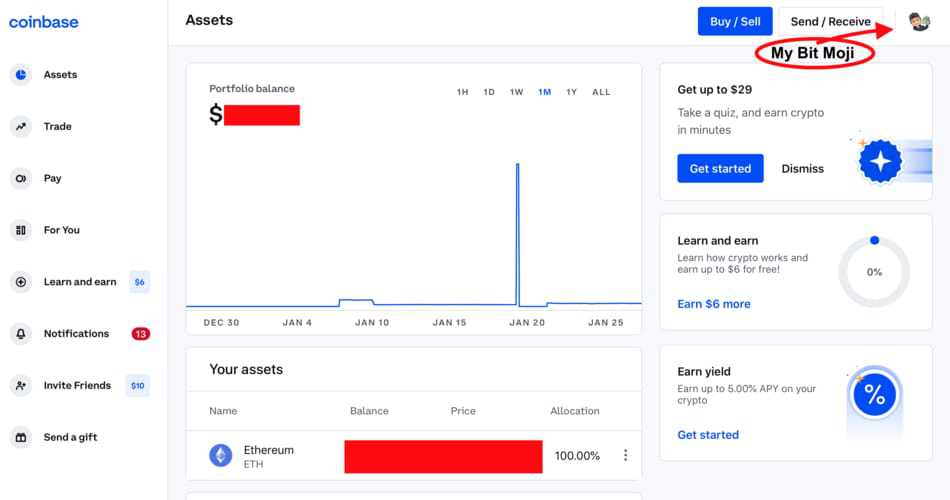If you are just getting your feet wet in the world of cryptocurrency, you likely have some level of concern about how to avoid scams and keep your digital assets safe. With that said, you may be wondering if Coinbase, the world’s leading cryptocurrency exchange, is FDIC insured?
Coinbase is FDIC insured. By using FDIC-insured custodial banks to house a percentage of user deposits, Coinbase achieves “pass-through” coverage from the FDIC, insuring user USD deposits for up to $250,000.
Start Trading Crypto on Coinbase Today ($5)

Earn a $5 in Bitcoin with Your Sign-up
- Coinbase is the easiest place to buy and sell cryptocurrency.
- Schedule buys daily, weekly, or monthly.
- Send and receive crypto to external wallets
- Great Mobile experience
- Protected by insurance
While Coinbase is technically FDIC insured, it should be noted that the coverage extends only to USD deposits and does not apply to crypto holdings. Read on to find out everything you need to know about Coinbase’s FDIC coverage.
Is Coinbase FDIC Insured?
Coinbase is FDIC insured. The fiat value of your Coinbase wallet will be insured up to $250,000 in the same way that a traditional bank insures your deposits.
This is because a large portion of Coinbase’s customer deposits are held by custodial banks who are insured by the FDIC. If one of these banks were to fail, Coinbase customers would have their funds protected by what is known as “pass-though” coverage by the FDIC.

Think of it like this: you entrusted Coinbase with your money and Coinbase entrusted a U.S. bank with their money. Therefore, you technically also entrust said U.S. bank with your money and earn FDIC protection.
Please note that Coinbase can only receive FDIC protection in the event that it keeps accurate customer records and upon determination of the FDIC as receiver at the time of a receivership of a bank holding a custodial account (more on this in the next section).
What Is FDIC?

FDIC stands for Federal Deposit Insurance Corporation. The FDIC is an independent agency created by the federal government designed to ensure stability and fortify public confidence in the nation’s financial system. Some of the key functions of the FDIC include:
- Insure customer deposits
- Examine and supervise financial institutions for safety, soundness, and consumer protection
- Make large, complex financial institutions resolvable – this is a fancy way of saying that even if a large bank fails, it will not have a catastrophic effect on the financial system or require bailout from taxpayers
- Manage receiverships – a receivership is a court-appointed tool that helps creditors collect on debts that are in default
What Does Coinbase Do With Your Money?
Until you purchase crypto, the cash you have sitting in your Coinbase account is backed by FDIC insurance. This is bank-level protection for your fiat that can give you confidence that your fiat will be there in the unlikely event of a Coinbase breach or dissolution.
So how does Coinbase get this level of FDIC protection? Well, let’s take a quick look at how banking works.
It may come as a surprise to some, but when you put your money into a savings account at a bank, your money is not just sitting there and waiting until you are ready to withdraw it.
No, the bank takes your deposit and immediately puts it to work. They may lend it to other clients. They may invest it.
Regardless of what the bank does with your money, its FDIC backing guarantees that whenever you are ready to make a withdrawal, it will have enough cash on hand to guarantee your request.
Coinbase does a similar thing with your fiat deposits. When you make a deposit on Coinbase, the platform may do one of several things with your money:
- Combines your money with that of other customers and places in a custodial account with a U.S. bank
- Invests customer funds in liquid U.S. treasuries
- Place it in USD-denominated money market funds in accordance with state money transmitter laws
While it may be a bit unsettling that Coinbase takes your fiat and farms it out, it’s really not that scary, for a couple of reasons.
Even though Coinbase is putting your deposits to work, it holds all customer funds separate from Coinbase funds (revenue earned through its core business). It will never use customer deposits to pay operating expenses (to do so would be in violation of the FDIC).
Any customer funds held in a custodial account are done so with banks insured by the FDIC. This helps the platform gain what is known as “pass-through” FDIC insurance, which guarantees customer fiat for up to $250,000 FDIC.
If any bank that held Coinbase custodial accounts were to fail, the FDIC coverage would apply to Coinbase customers.
Is My Crypto FDIC Insured on Coinbase?
No, your crypto is not FDIC insured on Coinbase.
Cryptocurrency is not legal tender and is not backed by the government, falling outside the scope of the FDIC.
However, Coinbase does provide some crime insurance to protect your crypto holdings on the platform. This helps make users whole in the event that their crypto is lost as the result of theft or cybersecurity breaches that are the fault of the platform itself.
It should be noted that losses are not protected in the event that the user loses his or her login credentials or has any other type of unauthorized access breach.
Recommended Financial Geek Article: Will Coinbase Refund Me If Hacked? (We Asked Coinbase)
It is incumbent upon the account holder to take the proper safeguards (strong password, 2FA, etc.) to keep their crypto safe. Check out my article here to learn more about how to keep your Coinbase account safe and secure.

Which Crypto Exchanges Have FDIC Insurance?
In addition to Coinbase, there are quite a few other crypto exchanges that offer FDIC insurance. Some of the names include:
- Binance.us
- CEX.IO
- Crytpo.com
- eToro
- Gemini
- Paxos/ItBit
Like Coinbase, these platforms offer FDIC protection only on USD deposits – not on crypto itself.
Is Coinbase FDIC Insured? The Facts
Coinbase is FDIC insured. By storing a certain percentage of user deposits in FDIC-insured banks, Coinbase achieves pass-through FDIC coverage for up to $250,000 per user account.
While this is exciting, the coverage only extends to USD deposits and does not apply to crypto holdings. However, Coinbase’s crime insurance, combined with your own cybersecurity best practices, can leave you confident that your funds are safe on Coinbase, USD or crypto alike!
As always, thanks for reading!
Geek, out.



![Is Wealthsimple Crypto Free? [Quick Explanation]](https://thefinancialgeek.com/wp-content/uploads/2022/01/Is-Wealthsimple-Crypto-Free.jpg)


